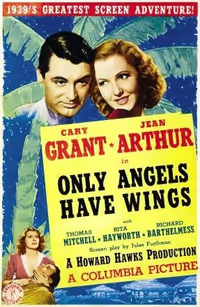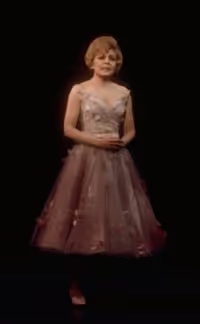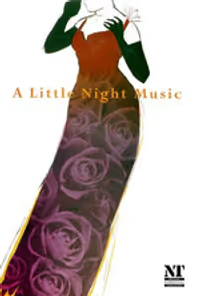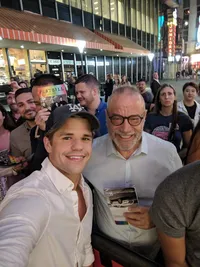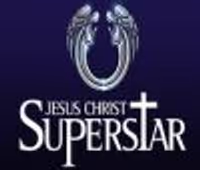Jim Weissebach /Jim Walton in Merrily We Roll Along
#25Jim Weissenbach /Jim Walton in Merrily We Roll Along
Posted: 11/30/14 at 11:25pmThat is true about her child, and her comments now aren't horrible, but the fact that she would say that to Toni during rehearsals seems really nasty.
#26Jim Weissenbach /Jim Walton in Merrily We Roll Along
Posted: 11/30/14 at 11:51pmI was rather shocked too, considering I love The Wild Party and both Toni and Tonya's performances in it. I actually don't agree with her regarding conflict (and the show didn't really change much from previews to opening) but it is still fascinating to hear her thoughts and experiences on that show and Caroline, or Change (which so consider the most powerful show written since 2000).
#27Jim Weissenbach /Jim Walton in Merrily We Roll Along
Posted: 11/30/14 at 11:54pmI disagree about Caroline, or Change, but I think that Toni Colette was better than Tonya Pinkins on the ahem "version" I've seen of the show, and I think the show would have benefitted from casting Kate as similar to the way the viciously good poem describes her.
#28Jim Weissenbach /Jim Walton in Merrily We Roll Along
Posted: 12/1/14 at 12:06am
Fantod, I realize we have different tastes in shows, so I understand your opinions regarding Caroline. However, what didn't you like about Tonya's Kate? I found her to sexy and have a lot of bite.
Regardless of your feelings on Caroline, you did enjoy her performance, correct?
#29Jim Weissenbach /Jim Walton in Merrily We Roll Along
Posted: 12/1/14 at 12:15am
Yes, at least from the "version" of Caroline I saw, she gave an excellent performance, but it sometimes is uncomfortable to watch because it was so real and so angry.
As for the Tonya in the Wild Party, I feel that she has a harsh voice and the score is enjoyable but also a bit harsh, and her voice brought out the uglier parts in the score, particularly in the song Need, which bookends Black is a Moocher. I don't know if you ever read Mildred Pierce by James M Cain or have seen the HBO miniseries (not the movie because it's too different from the book), but I pictured Kate when I read the poem as an older version of Veda, as a smoldering redhead, and a sexier counterpart to Queenie's vulgarity.
Updated On: 12/1/14 at 12:15 AM
#30Jim Weissenbach /Jim Walton in Merrily We Roll Along
Posted: 12/1/14 at 12:30am
Maybe because I was familiar with Caroline before Wild Party, but I found her Kate to be very sexy. I also enjoy the number "Need" (not "Lust" :)). Being a LaChiusa fan, I love the score, especially how it flips from playful to "harsh" as you say. It was my first LaChiusa score, and it made me a fan. I love how it seems like bits and pieces of a score, rather like what you hear at a party, and it makes the large numbers ("Lowdown-Down", "People Like Us", "How Many Women In The World?") have more impact.
I have often wondered what the Lippa cast would do in the LaChiusa score - I consider the cast fantastic but the show to be a letdown. What are your thoughts regarding the Lippa - LaChiusa debate?
#31Jim Weissenbach /Jim Walton in Merrily We Roll Along
Posted: 12/1/14 at 12:47amLippa's is pleasant but has no style, and what is the point of doing a jazz-age vaudeville show if you aren't going to do it with style? However, the script to that show is much cleaner, though I like the Wolfe approach to the every guest instead of focusing on the Burrs-Black-Queenie-Kate thing as the Lippa version does. I think the cast for the Broadway production was far superior in every way, though I would like to hear Idina Menzel tackle Wolfe's Kate now that she is older. Could be interesting. And I fixed the song Lust to Need, thanks for letting me know.
#32Jim Weissenbach /Jim Walton in Merrily We Roll Along
Posted: 12/1/14 at 12:49amAs for the score, my favorite song is either Uptown, When it Ends, or People Like Us, but I also really like the Gin/Wild sequence so I am not averse to any harshness, I just think that the Need number is too harsh.
#33Jim Weissenbach /Jim Walton in Merrily We Roll Along
Posted: 12/1/14 at 12:53am
I LOVE "Gin / Wild" - I'm a fan of sequences that really tell a story and have a lot of character development.
Just a question: what other LaChiusa scores have you heard?
#34Jim Weissenbach /Jim Walton in Merrily We Roll Along
Posted: 12/1/14 at 12:59amOkay, you might hate me, but aside from The Wild Party I absolutely despise LaChiusa. However, with all composers I dislike I try to listen to at least half of all of their shows to make sure that they don't have work I like. I tried to do that with LaChiusa, but after Bernarda Alba, Marie Christine, See What I Wanna See, and Queen of the Mist I couldn't listen to any more. I liked The Wild Party and thought that Giant was harmless, though I wasn't much taken by it.
#35Jim Weissenbach /Jim Walton in Merrily We Roll Along
Posted: 12/1/14 at 1:06amI certainly don't hate you - what keeps this world interesting is different opinions and Musical Theatre is one of the most subjective art forms. I was aware you weren't a fan of LaChiusa, but was wondering what other scores of his you knew. I actually love Bernarda Alba (I found the Quintet Sequence ("Magdelena / Angustias / Amelia / Martirio / Adela") absolutely thrilling, and the finale of Queen of the Mist is still one of the most moving things I've ever heard. I also love Marie Christine, and find Audra brilliant. However, I understand that others might not appreciate his stuff.
#36Jim Weissenbach /Jim Walton in Merrily We Roll Along
Posted: 12/1/14 at 1:14amI don't think it's very fair to say that I don't "appreciate" him as it is to say I just don't like him.
#37Jim Weissenbach /Jim Walton in Merrily We Roll Along
Posted: 12/1/14 at 1:20amI didn't mean that in a rude way. I just meant that his work is very different and many people don't like it. I didn't mean to sound offensive.
Wayman_Wong
Broadway Legend Joined: 4/22/04
#38Jim Weissenbach /Jim Walton in Merrily We Roll Along
Posted: 12/1/14 at 2:58am
To get back to the original topic, I interviewed Jim Walton for The Sondheim Review (Winter 1996). This is an excerpt:
Walton: ' 'Merrily' was my second Broadway show. [I was 25.] I was cast as Jerome, Frank's attorney. I had 10 or 12 lines altogether. I wasn't the understudy for Frank. Everyone was so excited about the show. We all felt it was going to be a hit.'
Wong: What do you remember about the previews?
Walton: 'People were walking out at the intermission. At the top of Act II, we were sitting in these bleachers onstage, and we could count the empty seats in the mezzanine. We were so disheartened. One day, Hal Prince took me aside and said the producers were not entirely satisfied with James Weissenbach. Prince made it clear that he was, but he wanted to know if I'd try playing the lead, five days from now. I said sure. Meantime, I still had to play the show opposite James and that was difficult. He's a terrific guy and I felt terrible for him. At the same time, I was so thrilled to have this opportunity.'
Wong: Did you and James ever talk about this?
Walton: 'Never, and we should have. I had many dreams about running into James on the street, and it got more and more emotional until we embraced and sobbed. That was heavy. I'd love to see him now and talk to him. It could be quite healing. Besides inheriting this great role, 'Merrily' had such an impact on my life. It was my big coming-out in the theater world and it was not a success. I was also married Nov. 27, two days before we closed.'
Wong: Was Franklin a tough part for you to play?
Walton: 'Yeah. It was hard to get a grip on Frank. You have to go from 43, a man in midlife crisis, to 20. I was so young that I couldn't identify with Frank; I played a man who's married for the third time, but I still looked like this tall, skinny 22-year-old kid. That's why it was easier for me to play Act II; as I got younger, it got closer to who I was.'
Since 'Merrily,' Walton has gone on to do about 6 more Broadway shows (including 'Sweeney Todd,' '42nd Street,' 'The Music Man'), plus the PBS broadcast of 'Crazy for You.' He's also done a Bistro Award-winning cabaret act with his brother, Bob. And I hope someday he gets another role of a lifetime because he's terrifically talented and deserves one.
#39Jim Weissenbach /Jim Walton in Merrily We Roll Along
Posted: 12/1/14 at 3:24am
Sorry to nip back to the previous posts but have you heard the score to Giant? It is glorious!
And I'm loving this fascinating thread! Makes a change not to have name-calling etc
#40Jim Weissenbach /Jim Walton in Merrily We Roll Along
Posted: 12/1/14 at 6:14am
This thread is fascinating, but I also had a note about LaChiusa: I haven't liked most of his stuff that I've heard -- I prefer Lippa's Wild Party, and I was bored by Hello Again, couldn't get through Marie Christine -- but I absolutely adore See What I Wanna See. The score thrills me. The title song, Coffee, You'll Go Away With Me, Feed the Lions. I think it's a terrific score.
As for Jim Walton, he's always annoyed me a little bit, but I was curious: @justoldbill Why were you infuriated by FOLLIES in concert? The recording is in my top five favorites, so I'm curious.
#41Jim Weissenbach /Jim Walton in Merrily We Roll Along
Posted: 12/1/14 at 8:15amInteresting how this has turned into more of another LaChiusa thread. On that topic, I'd add the old, old, old, old caveat "never judge a show by its cast recording." I've seen most LaChiusa shows, going back to when he did fun stuff with Jeffrey Essman like Triplets In Uniform, and have always (and I mean always) been bored stiff by everything he did post-Essman. I think his story-telling skills are just non-existent. But I can understand those who appreciate his work based on listening solely to truncated recordings, without sitting through the full (static) show.
#42Jim Weissenbach /Jim Walton in Merrily We Roll Along
Posted: 12/1/14 at 1:19pmFantod I absolutely agree with you about George Furth...his books for both COMPANY and the Merrily rewrite were horrible and as much as I LOVE COMPANY and MERRILY it is only because of the music...I saw one of the first rewritten productions that Furth let be seen of Merrily at UCLA and wanted to rush him and get in his face about the supposed better rewrite...I hated it and would have loved to seen the original book done, so at least the complete music score would have been there to hear...
#43Jim Weissenbach /Jim Walton in Merrily We Roll Along
Posted: 12/1/14 at 1:35pmThe rewritten Merrily book has some of the worst writing I've ever seen in a musical. At the end of the first scene Frank is supposed to turn around, go down on his knees, and scream "WHYYYYYYYYYYYY?" Thankfully I've never seen this done, but that's just the tip of the iceberg.
#44Jim Weissenbach /Jim Walton in Merrily We Roll Along
Posted: 12/1/14 at 1:47pm
I won't talk about Merrily, a show that has never entirely succeeded for me in more than 10 different productions, but I think the book for Company is brilliant - it's just not "timeless." It needs to be understood as a part of its time.
I also think Furth's successful comedy Twigs is very well-written.
#45Jim Weissenbach /Jim Walton in Merrily We Roll Along
Posted: 12/1/14 at 2:12pmI've neither seen nor read Twigs, but I'll put it on my list. Company is a well constructed musical and I don't doubt that it was appropriate in its time, but it just plays so datedly, and I think its a bit misogynist and homophobic.
#46Jim Weissenbach /Jim Walton in Merrily We Roll Along
Posted: 12/10/14 at 8:55pm
Here is a letter Tonya Pinkins wrote to Hal Prince after the announcement the show would closing after only 2 weeks.
"Dear Hal,
I know how it hurt you to have to tell us we’re closing. You’re like a father to us all and you probably feel as though “Daddy let down his kids”. Just know that we don’t feel that way. We have so much faith in you, Steve, George, Larry, and in Merrily
that we can say screw the critics and the audiences.
The Merrily We Roll Along you set out to do was
wonderful, innovative, and revolutionary and that’s what the audiences couldn’t take. Audiences today go to the theatre to be entertained, not to think, much less to be asked to question the courses of their own lives. And that’s really sad. They don’t want to see talent because it’s too dangerous. Serviceability is
the only thing they care about. Talent challenges, it makes waves, it forces them to get off their ––– and look at life for what it is.
It hurt me so to see the criticisms of showbiz be cut from the show because that’s what Merrily is and should be. It forced people to stop glorifying stars, it cut through the glamour and shook their ideals about success and fame. And his or not, Merrily
makes a statement which, as you well know, a few
years from now people will applaud.
It just seems unfortunate that five or so men shape the opinions of millions. Yes, I know that ticket prices are so high that people need to be assured they’re getting their money’s worth. But it’s sad that the many people who would have learned lessons from
Merrily will be denied that change, that theatre is so hooked to finance that creativity is bounded by
commerciality, that people like you and Steve lay your names on the line every time you start a project and that instead of people wanting you to dare, surprise, and question, they expect you to drum out the same things you did last year and the year before. The same ideas which they hated then because they were ahead of their time. It’s sad that so much great art is glorified posthumously.
We all love you as do millions of others who learn the rules only to transcend them. Please continue to give the world the art which you are so (in)famous for. Thank you.
--
Tonya Pinkins"
#47Jim Weissenbach /Jim Walton in Merrily We Roll Along
Posted: 12/11/14 at 8:06am
I wish that once--just once--somebody would tell us what we are supposed to discover after 2.5 hours of "thinking" about Frank, Mary and Charlie. Honestly, they don't strike me as all that complicated.
"I personally don't think the structure is a problem, as the original Kaufman Hart play works very well on paper...."
Fantod, that original play ran less than four months. Apparently, it didn't work very well either. And it didn't have the problem of coping with the inherit momentum of Western music. (See Sondheim himself on music as the "terrible monster" that rushes theater forward in time.)
As it was, the musical MERRILY was at best "two steps backwards, one step forward". It jerked audiences back and forward in time with few rewards (except lovely songs).
Updated On: 12/11/14 at 08:06 AM
#48Jim Weissenbach /Jim Walton in Merrily We Roll Along
Posted: 12/11/14 at 9:03amIt seems obvious to me that the "point" of Merrily is the same "point" of Follies, and it's something very few people under 40 can really understand - it's the idea that, no matter how much you plan your life, you're probably going to wind up becoming a person you didn't expect to be (and you may wind up becoming a person you don't really like).
#49Jim Weissenbach /Jim Walton in Merrily We Roll Along
Posted: 12/11/14 at 10:33am
I can solve the show's whole problem in seven words:
Flip the damn thing back-to-front.
Nobody cares about the characters because of the way we've been forced to "think" about them. Put back the book-end, flip the show into reverse order, maybe re-add the interstitials about intervening decades (also flipped appropriately), and you might have a show that's not just about those times, but about how friendships changed during them, and also addressing what newintown feels (and I agree) is the overall point of the show.
We get it, Steve. We get all the reasons it's art if you break it down intellectually. But Allegro can't be fixed. No matter how much you monkey with the works of a broken watch, it's still doomed to fall apart again -- it's a broken watch. Let it go. Give people a shot at actually caring about these characters.
Broadway Legend
joined: 5/1/05
Blocked: After Eight, suestorm, david_fick, emlodik, lovebwy, Dave28282, joevitus, BorisTomashevsky, Seb28
Videos


